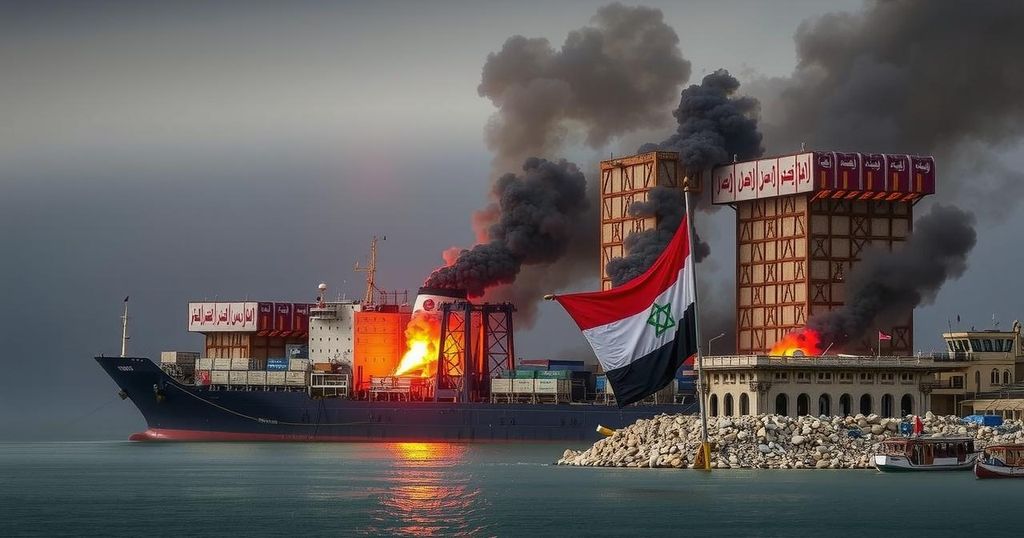Yemen’s Huthi rebels are increasingly viewed as a significant threat to Israel despite Iran’s diminished regional power. They have been launching missile and drone attacks aimed at Israel, complicating military responses due to their distance and impact on civilian life. Analysts are divided on Israel’s ability to effectively counter the Huthi threat, suggesting a need for strategic adaptation in an evolving regional landscape.
Despite significant weaknesses endured by Iran and its regional proxies, Yemen’s Huthi rebels continue to pose a notable threat to Israel. Following the decimation of groups like Hamas and Hezbollah due to intensified Israeli military actions, the Huthis have emerged as a principal concern for Israeli security. They maintain control over substantial territory in Yemen, including the strategic capital of Sanaa, and persist in orchestrating missile and drone attacks aimed at Israel, despite their technologically limited defense capabilities. The distance of nearly 2,000 kilometers complicates Israel’s capacity to respond proactively, creating a challenge for its military strategies regarding this distant adversary.
Furthermore, the Huthis express solidarity with Palestinian factions and have publicly pledged to sustain their assault on Israel until peace is established in Gaza. Analysts suggest that Israel may adopt countermeasures akin to its operations against Hezbollah, focusing on targeting Huthi leadership and disrupting their supply routes. However, the likelihood of these actions restoring effective deterrence remains uncertain.
While many Huthi attacks fail to result in significant damage due to Israel’s advanced air defense systems, the psychological impact on Israeli civilians is noteworthy, as evidenced by increased air raid alerts and disruptions in everyday life. The Israeli Air Force has responded with strikes on Huthi positions, including facilities at Sanaa International Airport, emphasizing the government’s commitment to countering the perceived Iranian threat.
Analysts express skepticism about Israel’s ability to fully neutralize the Huthi threat. The group continues to launch daily attacks against Israeli targets, posing ongoing complications for regional stability. Observers note that Arab Gulf states are cautious about escalating the situation, suggesting a carefully calibrated response to avoid broader conflict. In light of such tensions, the prospect of joint regional action against the Huthis could evolve, particularly with a potential change in U.S. foreign policy under an incoming administration.
Ultimately, even with Iran seemingly weakened, it retains the capacity to reinvigorate its proxy networks, suggesting that the threat from the Huthis may persist. Israel faces a complex challenge in addressing this menace, indicating a protracted security dilemma that may necessitate ongoing vigilance and strategic adaptation.
The geopolitical landscape in the Middle East has been turbulent, particularly regarding Iran and its affiliations with various militant groups. Israel has been engaged in sustained military campaigns to diminish the influence of Iranian proxies in the region, notably against Hamas and Hezbollah. The Huthi movement in Yemen, supported by Tehran, has increasingly become a focal point of concern for Israeli security. This analysis delves into the implications of the Huthi threat amidst changing dynamics in Iranian power projection and regional alliances, highlighting the challenges faced by Israel in addressing unconventional threats from afar.
In conclusion, the Huthi rebels represent a persistent security threat to Israel despite the apparent weakening of Iran’s influence and its associated groups. Their ability to launch sustained attacks from Yemen complicates Israel’s military responses, creating a challenging environment for national security decision-making. While potential strategies may be considered to mitigate this threat, analysts emphasize the limited effectiveness of such responses without broader regional cooperation and a clear understanding of the complex geopolitical implications at play.
Original Source: www.hindustantimes.com






